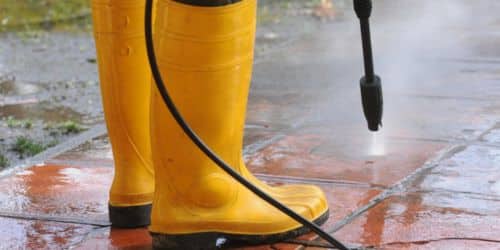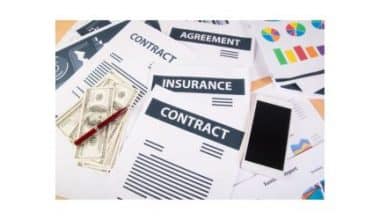Do you clean homes using high pressure? If something goes wrong while you’re pressure washing, your insurance coverage will cover the costs. The exterior washing industry is not without its dangers. Always think about the safety of your professional cleaning business and yourself when making smart judgments about insurance. Compare insurance quotes from today’s most reputable companies to choose the plan that best suits your cleaning business’s needs. In this article, we will discuss how to get pressure washing insurance in Florida and how this insurance works.
What is Pressure Washing Insurance?
Pressure washing insurance is a special form of liability coverage designed to protect businesses and individuals engaged in pressure washing services. Pressure washing involves using high-pressure water sprays to clean surfaces like buildings, driveways, and sidewalks. While this service is valuable, it carries inherent risks, such as damaging property or injuring bystanders.
Pressure washing insurance typically includes several types of coverage, including:
#1. Commercial General Liability Insurance
Commercial general liability (GL) insurance protects professional outside cleaners in the event of an accident, property damage, bodily injury, or other covered incident. If your tools get stolen or damaged on the job, or if you’re sued, general liability insurance will have your back.
What role does general liability play in a pressure washing company’s operations?
Simply put, you will likely be responsible for paying the fees associated with these occurrences and any other penalties incurred if you do not have this form of insurance. Small business property damage and liability claims average over $30,000, so it’s important to make sure you’re protected.
Furthermore, general liability insurance for pressure washing businesses operates as follows: You’ve been hired to clean the customer’s driveway and walkway. The hose of the pressure washer tangles around the stand holding a pricey plant pot as you travel around the house to the area you wish to clean. The plant pot is broken and the stand is pushed over. Your policy’s general liability protection may be able to cover the cost of repairs.
Without proper pressure washing insurance coverage, you’ll have to pay for damages and injuries out of your own cash. You won’t have to worry about the bill for even a second if you have insurance. To the extent of your policy’s coverage, you will not be responsible for paying for the customer’s potted plant’s repair or replacement costs or any other expenses incurred as a result of the incident.
So what does general liability insurance cover?
- Bodily injury to another person
- Third-party property damage
- Personal and advertising injury
- Medical expenses
- And more
#2. Workers Compensation Insurance
Workers’ compensation insurance is required by law in the majority of states if you employ any workers, whether they are full-time, part-time, or temporary. This insurance covers workers in the event that they become ill or injured on the job.
There are a number of reasons why this insurance is important, but the most important is that without it, you will be responsible for covering the costs associated with an injured employee. But what would your out-of-pocket cost be? It’s a lot more than you probably imagined.
According to the National Safety Council, the typical workers’ compensation claim costs $40,000. For a company, especially one just starting out, to be hit with a charge like that might be devastating.
Workers compensation insurance for pressure washing businesses may cover:
- Medical payments
- Lost wages
- Rehabilitation expenses
- Death benefits
#3. Business Auto Insurance
Investing in a business owner’s policy might provide the greatest return on investment. General liability insurance and business property insurance are integrated into one convenient package.
The premium you pay for your business owner’s insurance will depend on what you do and what you want covered. Buying individual policies will cost more in the long run than a BOP. A business owner’s coverage might be affordable for a tiny pressure cleaning company at as low as $350 per year. The average cost of a company owner’s insurance policy is $30 per month.
#4. Inland Marine Insurance
When your tools and equipment are in transit or being used on a construction site, having inland marine insurance can help safeguard them financially.
You might, for instance, be working at a construction site and enjoying a lunch break there. While you were away for lunch, someone broke into your vehicle and took all of your tools, despite your best efforts to keep them safe.
That’s why having Inland Marine Insurance is so important. It can help prevent the following financial losses for your company:
- Damage to business property
- Theft of business property
- And more
If you didn’t have inland marine insurance, you’d have to replace the stolen equipment on your own dime. On top of that, you might not be able to take on any power-cleaning jobs, meaning you lose out on potential cash.
#5. Cyber Insurance
More than half of today’s small enterprises with fewer than 1,000 employees have been the target of a cyberattack, according to a recent survey. Cyber insurance is increasingly needed by pressure-washing businesses that save their client data online. In the event of a cyberattack on your pressure washing firm, cyber insurance can let you continue operating while repairs are being made.
Consider the following hypothetical claim: a hacker gains access to your company’s account, allowing them to view sensitive client data as well. Your small firm can get back on its feet quickly with the help of a cyber insurance policy. Nice!
Cyber insurance costs roughly $110 per month for many small firms. How much are you prepared to spend on safety precautions?
Pressure Washing Insurance Cost
In order to protect themselves from lawsuits, pressure washing businesses spend an average of $121 per day, $103 per month, or $1,123 per year for general liability insurance. You can get coverage through Thimble on a per-project, monthly, or annual basis, depending on your needs.
Getting a quote is the best method to find out how much insurance will actually cost you, but a quote from Thimble will only take a few things into account.
#1. Policy Duration
You can get an insurance policy for as little as an hour if it’s just for a one-time pressure cleaning job. However, it may be more cost-effective to purchase insurance for a longer period of time if you book pressure washing services throughout the year.
#2. Involved Parties
Another factor to take into account is the number of employees that your pressure washing business insurance will cover. Every worker and volunteer who aids in the execution of your pressure washing services should be included here. You can save a lot of money in the long run if you spend the money now to insure your whole crew.
#3. Policy Modifications
Last but not least, you may often add coverage for related services to your pressure washing insurance. Thimble, for instance, lets you include related services in your coverage, such as exterior painting and chimney cleaning. This supplemental insurance allows you to tailor your policy to include any and all services you provide to clients. This supplemental insurance will extend the scope of your primary policy so that you won’t have to buy separate policies for each service you offer.
What Are the Expenses of a Pressure Washing Business?
The expenses of a pressure washing business can vary based on the scale of operations, location, and specific services offered. Here are some common expenses associated with running a pressure-washing business:
- Equipment: High-quality pressure washers, surface cleaners, nozzles, hoses, and other related equipment are significant upfront costs.
- Insurance: As mentioned earlier, insurance premiums cover general liability, property, and workers’ compensation insurance, ensuring protection against various risks.
- Chemicals and Detergents: Specialized cleaning solutions for different surfaces require regular replenishment.
- Fuel: Fuel costs for operating vehicles and pressure washing equipment on-site.
- Vehicle Expenses: Maintenance, fuel, insurance, and depreciation for business vehicles used to transport equipment and travel to job sites.
- Marketing: Advertising, website maintenance, and promotional materials to attract customers.
- Licences and Permits: Fees for business licences, permits, and certifications required to operate legally
- Employee Wages: If you have employees, their wages, benefits, and taxes are significant ongoing expenses.
- Maintenance and Repairs: Regular maintenance and occasional repairs for pressure washers and other equipment.
- Office Supplies: Expenses for office supplies, software, and tools for administrative tasks
- Transportation and Travel: Costs related to travelling to and from job sites, especially for businesses that operate across a wide area.
- Taxes: Business taxes, including income taxes and sales taxes, need to be budgeted for.
- Utilities: Costs for electricity, water, and other utilities if you operate a physical location.
Managing these expenses effectively is crucial for the profitability and sustainability of a pressure washing business. Proper budgeting and financial planning are essential to ensure the business can cover its costs while generating revenue.
Do Pressure Washers Make a Lot of Money?
Pressure washers who are successful might make an average annual salary of $25,000 to $60,000. That number multiplies by four or five if you have a crew of four or five pressure washers working full-time.
On average, a pressure washing business of a respectable size can bring in between $100,000 and $200,000.
How to Get Pressure Washing Insurance
Obtaining pressure washing insurance coverage involves several steps to ensure your business is adequately protected.
#1. Consider the Dangers That You Face as a Company
Before deciding on a policy’s limits, it’s important to assess the dangers your company confronts.
While any business owner must be aware of the possibility of general threats like injuries and financial setbacks, pressure washing company owners may additionally face hazards like:
- Responsibility for damage caused by waterborne debris, like shattered windows, on the property of a customer.
- Pressure washer hoses and tools are tripping up customers.
- The illegal release of sensitive customer information.
- Workplace slips and falls lead to back injuries among workers.
Don’t rush into making plans for your company’s response to potential lawsuits, mistakes, accidents, or natural disasters. When determining the level of risk you provide and the associated premium, insurers will look at a number of factors, including the size of your company, the types of work you do, your physical location, and the value of your assets.
#2. Set Your Insurance and Protection Priorities
What follows is a rundown of the various types of pressure washing insurance that may be required by pressure washing businesses.
- General liability insurance
- Workers’ compensation insurance
- Commercial property insurance
- Business interruption insurance
- Commercial auto insurance
- Cyber liability insurance
Also, it’s possible to combine various forms of protection into a single business owner’s policy. Business owner policies (BOPs) can be tailored to match the specific needs of your company and often include coverage for general liability, commercial property, and business interruption.
#3. Establish Your Preferred Method of Purchasing
There are a few steps you can take to locate suitable commercial insurance.
- Make direct contact with your insurance company. Commercial pressure washing insurance is available from many different companies. That requires making individual calls to businesses to request price estimates.
- Go shopping on the internet. Online marketplaces for business insurance can simplify the search for suitable coverage. You acquire quotations from several insurers, then compare them to discover the best offer after providing information about yourself, your business, and the coverage you want.
- Use the services of a broker. A broker for insurance policies can provide individualized service. After you and the broker have discussed your requirements, the broker will begin gathering quotations from several providers.
#4. Evaluate the Various Service Suppliers
Before settling on a supplier, it’s a good idea to compare prices from numerous vendors. Things to think about while contrasting service providers are:
- The scope of coverage: So, what exactly does this insurance cover? To what extent are gaps present?
- Limitations of liability: How much of a loss will the policy cover? A higher limit could be necessary if you run a more substantial or high-risk enterprise.
- Price: What is the estimated premium? If so, how much would it be? Price, please. Do all of the policies share the same coverage and liability limits?
- Reviews: The number of complaints lodged against an insurance provider can be viewed on the website of the National Association of Insurance Commissioners. Before choosing an insurer, it’s a good idea to check out how highly they’re rated.
#5. Obtain Insurance, Then Plan for Regular Evaluations
Make sure you know when premiums are due and how to make changes to your policy, such as adding riders or requesting a new certificate of insurance, after buying insurance.
You should review your company’s insurance policy every year. When it comes time to renew your insurance plans, consider not only how you feel about the coverage, costs, and customer service you’re receiving, but also any new hazards you may be exposed to. That way, you can rest assured that your company is adequately covered at all times.
Pressure Washing Insurance Florida
In Florida, obtaining pressure washing insurance is crucial for your business’s protection. Start by researching insurance providers in the state that specialize in commercial liability coverage and have experience dealing with businesses in Florida. These providers understand the unique risks associated with operating in the state, such as weather-related challenges and specific regulations.
When seeking pressure washing insurance in Florida, focus on policies that include general liability insurance. This coverage protects your business from third-party claims related to bodily injury or property damage. Given Florida’s high humidity and frequent rain, having coverage for potential slip-and-fall accidents or property damage caused by your equipment is essential.
Additionally, consider other types of insurance that might be relevant to your pressure washing business, such as commercial auto insurance if you have vehicles used for work purposes or workers’ compensation insurance if you employ staff.
Make sure to comply with Florida’s insurance regulations and provide all necessary documentation, including your business licence and details about your pressure washing equipment. Compare quotes from different insurance providers to find a policy tailored to your business needs and budget.
Lastly, stay informed about any specific insurance requirements or regulations that may apply to pressure washing businesses in Florida, as these can vary based on local laws and industry standards.
Best Pressure Washing Insurance
These are the leading providers of insurance for pressure washing services. Get the details on the benefits, drawbacks, and regular premiums for a $1,000,000 general liability policy.
#1. NEXT: Best Overall; Fastest General Liability Insurance for Pressure Washing Businesses
NEXT is an insurance provider with a focus on the unique requirements of small businesses like sole proprietorships, partnerships, and expanding LLCs. This provider serves customers in all 50 states and is especially proud of the efficiency and convenience of its digital insurance products.
All of your bases are covered with NEXT’s custom pressure washing insurance package: general liability, contractors’ professional liability, workers’ compensation, commercial car, and commercial property. You can save 10% on your insurance rates by acquiring two or more policies from this provider at the same time.
Discounts aren’t the only reward of working with NEXT; you also get access to live certificates of insurance, quick response times from customer service representatives, and the ability to file and track claims online.
Pros:
- Get a certificate of insurance online and share the link by text, email, or social media.
- Most expedient commercial pressure cleaning insurance coverage
- Outstanding track record in customer satisfaction
- Provides immediate online insurance documentation.
- Excellent cost-effectiveness
Cons:
- None
Average cost: $40 per month
#2. CoverWallet: Best Pressure Washing Insurance Quotes Comparison Online
The company’s insurance partners provide a variety of policies that make up CoverWallet’s custom pressure washing business insurance. You can choose from commercial property, commercial auto, commercial liability, and general liability insurance. A company owner’s policy combines coverage for commercial property, general liability, and workers’ compensation into a single package.
If you’re in the market for pressure washing business insurance and want to compare quotes from several providers, this organization can help. Get pressure washing insurance quotes from many companies and easily compare coverage, price, and more with CoverWallet’s online quote comparison tool.
Get instant protection by using CoverWallet. Getting insured with this firm is quick and easy, and no insurance agent is required. When you sign up for CoverWallet’s services, you’ll gain access to the MyCoverWallet mobile app. You may make payments, make changes to your coverage, and even print proof of insurance all from within the app.
Pros:
- Online payment of premiums is available.
- Remove coverage at any moment
- Find affordable protection quickly and easily in the digital world.
- No-cost insurance policy certificate
- Include uninsured family members at no cost
Cons:
- A broker, rather than an insurer, handles insurance policies.
Average cost: $45 per month
#3. Thimble: Best Pressure Washing Businesses Looking For Short-Term General Liability Insurance
Thimble is an internet insurance broker that has been operating out of New York since 2015. It collaborates with a number of insurance providers to underwrite the policies. Thimble is the superior option if you require short-term insurance protection in order to close a deal.
In addition to standard plans like general liability and BOP, Thimble also offers specialized options, including commercial property insurance, professional liability insurance, business interruption insurance, and even cyber liability insurance for pressure washing businesses.
Thimble makes sure your company has the insurance protection it needs, even if you don’t always need that much. The only drawback is that everything has to be done online. Also, Thimble offers temporary general liability insurance. The per-incident cap here is between $1,000,000 and $2,000,000.
Pros:
- Online service that is fast and reliable
- Hourly, daily, or monthly coverage
- No surprises or additional costs in the pricing
Cons
- Calling customer support is now unavailable.
Average cost: $50 per month
#4. Hiscox: Best General Liability Insurance With Worldwide Coverage for Pressure Washing Businesses
Cyber liability coverage is limited to $300,000 per occurrence through the Hiscox pressure washing insurance program. In order to obtain insurance for your business, such as workers’ compensation, commercial auto, general liability, or professional liability, you will need to speak with a representative.
Pros:
- The coverage is global.
- Quickly handle claims
- Fast to provide a price range
Cons:
- Only cyber liability insurance is available for purchase online, making it the only option for pressure washing companies.
Average cost: $52 per month
Why Should I Get Insurance for My Pressure Washing Business?: Bottom Line
If you’re planning to use your credit card for additional business expenses, like new machinery or advertising services, the prospect of incurring yet another charge may seem frightening.
However, without insurance, you’ll have to pay a lot more money out of your own pocket to settle any legal disputes that may arise, such as if you accidentally damage a customer’s property while pressure washing it and the customer sues you. Also, if your state mandates insurance and you don’t have proof of coverage, you could be in legal hot water.
Without insurance, the average costs for a small business owner are disastrous.
- $30,000 for property damage or accident claims
- $39,000 for work injury claims
- $50,000 for reputational harm claims (like in cases of slander or libel)
- $20,000 for a customer slip-and-fall case
In addition, disputes and lawsuits are also common occurrences. About 43% of small business owners have said they were sued or threatened with legal action. Another shocking reality is that customers can sue you even if you’ve done everything right. If they were dissatisfied despite your best efforts and they dragged you to court, you may be on the hook for legal fees even if you did everything they asked of you.
The good news is that if you purchase enough coverage, your company won’t have to worry about covering the expense of claims and lawsuits.
Frequently Asked Questions
Is a pressure washing business worth it?
Yes, a pressure washing service can provide you with substantial and steady revenue that develops as your company does.
What is a pressure washing contract?
A pressure washing contract, which is a legally binding document, outlines the terms and conditions of the services that a pressure washing contractor will offer to a client. This contract serves as a formal agreement between the two parties, detailing the scope of work, responsibilities, payment terms, and other essential aspects of the pressure washing project.
Similar Articles
- Best Workers’ Compensation Insurance in Georgia 2023
- BUSINESS LIABILITY INSURANCE COST: 2023 Cost Guide
- Cheap Small Business Insurance: Best of 2023
- BUSINESS INSURANCE QUOTES ONLINE: Best Services & Quotes






